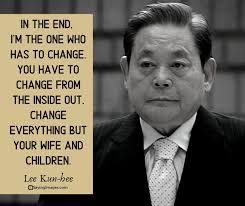B”H
Samsung Electronics chairman Lee Kun-hee, who passed away in 2020, pioneered the launching of its first handset in 1988, the first South Korean company to do so. At the time, the handset market was dominated by Motorola. Lee, who became a global innovator, making Sony Electronics, the largest Conglomerate, had accurately predicted that an era where one person will own at least one wireless handset is coming. He stressed the importance of the phone business, designating a future growth trajectory for Samsung Electronics.
Samsung focused on expanding its production rate to catch up to Motorola. Like most South Korean companies it focused on quantity over quality. Samsung’s defect rate for handsets was at one time as high as 11.8%. One out of ten handsets bought by consumers would become defective. But the mindset that “quality was best” was difficult to change.
On March 9, 1995, Lee took a bold step and ordered all the handsets sold in the market to be recalled and burned in a field outside the Gumi Factory, where they were produced, in front of its employees. This event is now called “Anycall Burning.” Around 2,000 employees, wearing headbands with “Quality First” written on them watched as the fire destroyed the entire mobile phone stock comprised of 150,000 units that had been collected, and then the bulldozers went over what was left.
Samsung shifted radically to a quality-only philosophy and from then on instituted reforms. Lee said that if Samsung became the world’s top handset company, its profit would grow three to five times what they were making at the time. He also said, “If you continue to make so-called quality products like those defective ones, then I’ll come back and do the same thing, set those on fire.”
In this week’s Parsha כי תשא Moshe comes down from Heaven where he was for forty days without eating or sleeping, to find the Jewish people worshiping the golden calf. Moshe decides to break the holy tablets that were written by the hand of G-d in protest ofU the Jewish people’s grave sin.
Chasidus explains that one should not make the mistake of thinking that Moshe broke the tablets as a way to vent anger. As the leader of the nation, Moshe understood that he needed to send a powerful message to the Jewish people in order to shake them up. He understood that the only way that the Jewish nation would take to heart the gravity of their sins was to respond with an action that would force them into a complete state of humiliation.
Moshe also saw in this action the ability to rebuild a better and stronger nation. Yes, the people had fallen to their lowest depths, but now they could use their experience as a building block to transform themselves into better and stronger people.
Whether you are practicing to become someone in a leadership position like a teacher, or CEO of a corporation, or even becoming a parent, there are certain instances that the only way to correct a negative trend is to shock the system, radically halting the negativity instantaneously.
Once that is accomplished you can start to rebuild a healthier and stronger positive future.
Remember that an abundance of thought has to be put into the planning of this tactic so that it is not viewed as personal in any way.
Another important lesson that Chasidus teaches us from the breaking of the tablets is that humans are not perfect.
We all have had our bad moments which we are not proud of, however, we must also remember that the broken tablets were placed in the Holy Ark alongside the second set of tablets.
When our unworthiness is dealt with by using each of us as a spiritual springboard for rebirth; our mistakes, failures, and shortcomings become just another stepping stone to success, purity, and holiness.
There is a famous saying that says “When a shell is broken from the outside, it is a sign of death however when it is broken from the inside, it is a sign of life.”
Have a wonderful Shabbos.
Yitzchok Friedman

